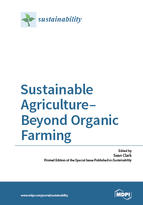Sustainable Agriculture–Beyond Organic Farming
A special issue of Sustainability (ISSN 2071-1050). This special issue belongs to the section "Sustainable Agriculture".
Deadline for manuscript submissions: closed (30 June 2016) | Viewed by 168517
Special Issue Editor
Interests: agroecology; food systems; cropping systems; soil quality; pest management; entomology; horticulture; climate change mitigation
Special Issues, Collections and Topics in MDPI journals
Special Issue Information
Dear Colleagues,
The current conception of organic farming—as a production system based on ecological understanding and management—is the result of nearly a century of intellectual thought and dialogue, field observations and experiences, systematic experimentation, and codification of rules. Today, organic production is widely recognized as a viable alternative to conventional production under many conditions and increasingly sought out by consumers concerned about environmental issues, such as agricultural pollution, the loss of biodiversity, and soil conservation.
Considerable research supports the validity of such value-based consumer choices, but there are other areas in which inherent trade-offs exist because the current performance of organic systems often does not match that of conventional systems, such as in yield per unit of land, labor efficiency and costs of production. Further, organic standards may not explicitly or sufficiently address important concerns about climate change, animal welfare and the quality of life provided to farmers, farm workers and others in the supply chain. As our understanding of the agroecology and food systems develops how is organic farming changing and evolving? Additionally, what role can organic farming and related movements play in addressing the many and complicated food-system challenges facing society?
This Special Issue invites papers on how to build upon the significant progress of organic agriculture in order to address continuing and emerging challenges to the sustainability of food systems.
Topics could include, but are not limited to:
- Fundamental lessons in agroecology learned from organic production systems
- The adaptation of organic methods and certification to evolving knowledge and values
- Integration of new and emerging knowledge and technologies into organic management
- Supply-chain certification and communication systems dealing with environmental, social/ethical and economic aspects of food systems
- Case studies or examples of agricutlural/food systems systematically and comprehensively addressing environmental, economic and social/ethical issues
Dr. Sean Clark
Guest Editor
Manuscript Submission Information
Manuscripts should be submitted online at www.mdpi.com by registering and logging in to this website. Once you are registered, click here to go to the submission form. Manuscripts can be submitted until the deadline. All submissions that pass pre-check are peer-reviewed. Accepted papers will be published continuously in the journal (as soon as accepted) and will be listed together on the special issue website. Research articles, review articles as well as short communications are invited. For planned papers, a title and short abstract (about 100 words) can be sent to the Editorial Office for announcement on this website.
Submitted manuscripts should not have been published previously, nor be under consideration for publication elsewhere (except conference proceedings papers). All manuscripts are thoroughly refereed through a single-blind peer-review process. A guide for authors and other relevant information for submission of manuscripts is available on the Instructions for Authors page. Sustainability is an international peer-reviewed open access semimonthly journal published by MDPI.
Please visit the Instructions for Authors page before submitting a manuscript. The Article Processing Charge (APC) for publication in this open access journal is 2400 CHF (Swiss Francs). Submitted papers should be well formatted and use good English. Authors may use MDPI's English editing service prior to publication or during author revisions.
Keywords
- sustainable agriculture
- organic farming
- food systems
- agroecology
- green supply chains
- local
- diet
- animal welfare
- third-party certification
- ecolabelling
- fair trade
- ethical consumerism
- humane






